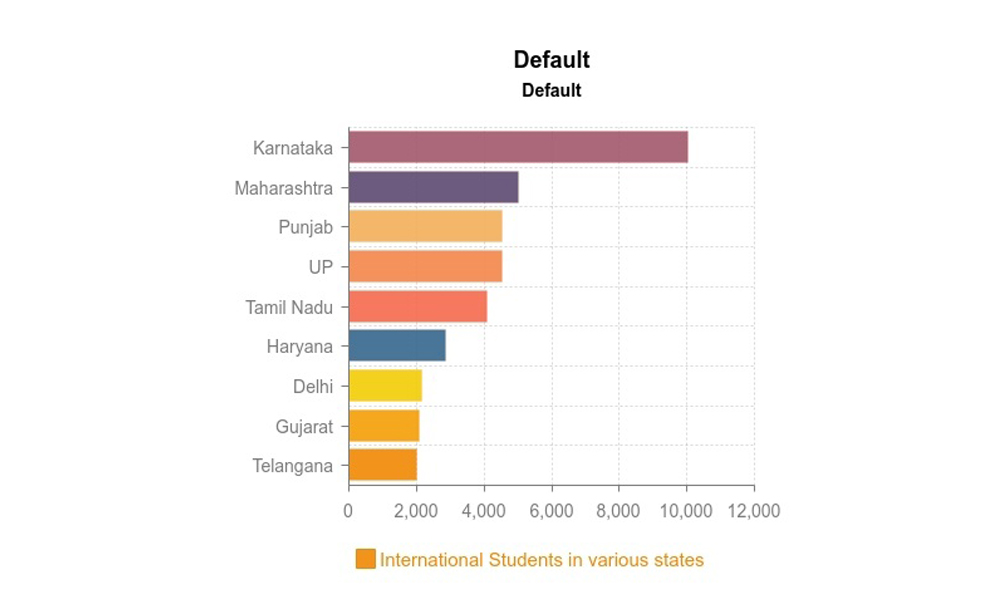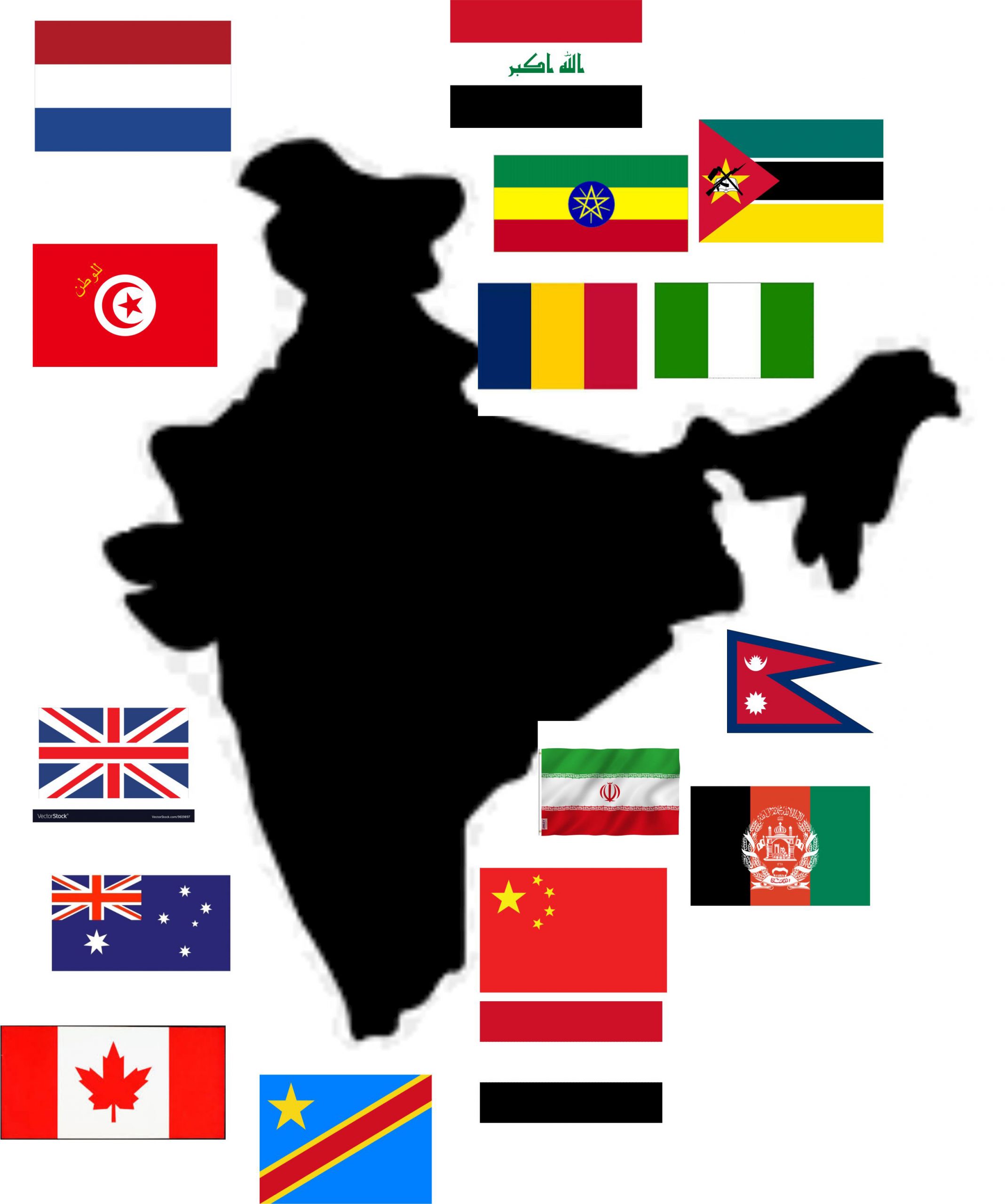More than 10,000 international students have enrolled in different universities of Karnataka, under the ‘Study in India’ programme of the centre.
By Astha Oriel
Bustling crowd, with students loitering around the campus, some discussing literature, while others discussing art, is a reality in most of the colleges of Bangalore. While many youngsters come from various parts of India to pursue their higher education, some also come from foreign lands in search of better education. . Data released by Ministry of Human Resource and Development for the year 2018-2019 states that 47,427 students have been enrolled in India for higher education. Of these, 10, 023 preferred to study in Karnataka, which tops the chart in number of foreign students. These students have come from 164 countries, mainly from Nepal, Afghanistan, Bangaladesh, Sudan, Bhutan and Nigeria.
Most foreign students try to find a connect between India and their countries. Adriana Da Graca, an undergraduate student from Mozambique, who is studying Arts and Sociology, in Christ University, recalled the visit of four Indian Prime Ministers to Mozambique. She said, “The culture between India and Mozambique is very similar. Since we also have many Indians living in Mozambique, I never felt to be culturally different from India. It’s been three years since I am studying in Bangalore, but nothing felt different.”
“There is a major difference between education in India and Mozambique. While in Mozambique, our education is only limited to learning, in India I was introduced to both learning and comprehensive form of education. The only thing I struggled with after coming to India was English, but now I have managed that also,” she added.
Adriana has 11 other international students studying in her class.
Dr. M. J .Vinod, a political science and International relations professor at Bangalore University observed this as India’s soft power projection. “We have seen a large number of students coming from Afro- Asian world. They come to India due to various reasons. India is a good proposition for International students because, the education system in India is different from other countries.”
In July 2019, the Ministry of Finance, introduced ‘Study in India’ campaign, which focuses on bringing international students to study in India. Under the campaign more than 70,000 students from 190 countries have applied for the admissions. The admission process for the campaign ended in August 1, 2019.
“We have a lot of admissions being made through the Indian Council of Cultural Relations (ICCR). So, it’s ICCR who sends the profile of foreign students to various universities. And after that the respective university looks for the eligibility of that particular candidate in the university as well as for the course, as per the speculation of the university,” Dr. Vinod added.
Just like Adriana, another student Mahamat Tom Dillo Hadjar, a student from Chad, a country near France, pursuing Arts and Sociology spoke to The Softcopy regarding his inclination towards Bollywood. “Bollywood is everywhere. Before coming to India for pursuing education, I used to watch Bollywood movies because they were fun and that’s how I got to know about India.”
“The only difficult part for me, regarding studying in India, was studying in English. Since I have a French and Arabic background, I found it really difficult initially to adapt to English language. But now I am pretty okay with it. Also, I found studying economics difficult and the regular attendance in college is also quiet different from my country. Sometimes, it becomes tough to manage, if you are not focusing on the studies,” he added.
“Most of us come here on the basis of scholarship. I have come here because I somehow managed to get a scholarship,” Tom said.

Dr. Vinod added, “This form of education system, helps India to know about other domestic societies as well. With the arrival of International students, the students can have debates and discussions about different societies, as well as, the political challenges that different country face. So, in a way, the foreign students give a perspective about what is happening in their country. And at the same time, they are able to enhance their understanding about India as well. It also clears up any misconception regarding India’s internal policy as well as foreign policy. So, institutionally and academically, it makes a big difference.”
Prajwal Babu Rai, a student hailing from Nepal and a second year student studying B.Sc Radiology at Christian Medical College, Vellore told the Softcopy that he got to know about the programme in India through an Organisation in Nepal. He said, “The organization selects certain students from Nepal to study in Medical Colleges of India. Only for the first year, I paid the fees for both college and hostel. But from second year onwards the organization is paying my fees.”
Prajwal finds a huge difference between education system of India and that of Nepal. “In Nepal, the primary focus in most of the medical college was to only teach theory. We do not get much practical exposure during first or second year of college. Only once we complete our final year and enter internship, we get practical exposure. But here in India I am getting a first hand practical exposure right from the beginning of the college.”
“Geographically, I found India different from Nepal. Nepal is a bit colder than India,” Rai added. “But culturally I feel nothing different with India and Nepal. I feel at home, to be honest.”
Samarpit Charan, who also studies in CMC Vellore, told the Softcopy that studying with International students in India makes them learn about a lot of things. “We get to learn about different languages and also about different cultures. It is always a pleasant experience to study with them, since apart from academic studies, we learn about things which we had no prior knowledge.”
Aditya Kumar, who studies International policy in Jindal Institute of International affairs, said, “If foreign students are coming to India, then it have a huge impact on tourism as well. In order to boost the economy, many universities are now opting for Student Exchange programmes.”
“If an international student actually liked studying in India and prefer staying in India, this might boost the migration as well,” Aditya added.
Dr. Vinod further observed that international students would also have a great sense of understanding of different policies. “In the perspective of International politics, most of the students who study in India, join civil services in their country later. And at the same time, they have a wide range of understanding regarding foreign policies as well. So this can be an input in policy making as well. Educational exchange is a big bridge building between societies.”
Professor Mirza Asmer Beg of Aligarh Muslim University, an expert in international affairs, echoed the thoughts of Dr. Vinod regarding soft power.
He stated, “This is an age where military power is not the only way to access any other country and increase its strength. Through soft power many countries are able to access each other. Soft power comes through economy, culture and education.”
“International relations are maintained with the level of understanding. So if international students are coming and studying in India, then it would obviously help in understanding the diversity, culture, democracy and society. It also exposes the capabilities within a country.” Professor Beg added.
Dr. Vinod observed this whole process as a bridge building between societies as well as its major role for policy making internationally. “In the perspective of International politics, most of the students who study in India, join civil services in their country later. And at the same time, they have a wide range of understanding regarding foreign policies as well. So this can be an input in policy making as well.”




